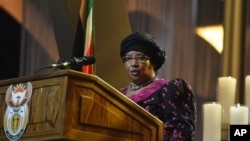JOHANNESBURG —
An official with Malawi's environmental ministry was found in his car with $300,000 in cash last September, touching off a series of events that resulted in a massive corruption probe implicating dozens of civil servants, former government ministers and business people.
Suspected of looting more than $100 million from government coffers since 2006, defendants recently began entering pleas ahead of trials slated to get underway January 29.
Dubbed 'cashgate,' the scandal cuts deeply both economically and politically, causing many foreign donors to halt aid. In a country where 40 percent of the budget comes from abroad, politicians and economists are still struggling to gauge the fallout.
"I suppose in the history of the Malawi justice system, we have never seen anything like it," says Bruno Kalemba, Director of Public Prosecutions. "As one who is involved in these cases — ourselves, the investigators, the courts — it's unprecedented."
For President Joyce Banda, who assumed office intent on restoring international donor relations, which had been frayed by her predecessor, the scandal has put her political future in jeopardy.
"It is an issue of national concern," says Joseph Chunga, head of the Political Science Association of Malawi. "I think the way it's going to be dealt with will have serious implications on the political landscape in terms of power configuration, but also in terms of the trust people have in our institutions."
Despite setbacks in public trust, both Banda and the economy have made progress: the IMF recently agreed to disburse $20 million in previously withheld aid, citing progress in anti-corruption safeguards, and 2014 economic growth projections are pegged at five percent.
While some suspect Banda's involvement in cashgate, her swift reaction and commitment to reforms — creation of a special police unit dedicated to monitoring public finance, investigations, new anti-corruption safeguards — has been viewed a positive step.
"She has moved in to take some bold measures to deal with the problem, even though we are only four months or so before elections," says political scientist Blessings Chinsinga, a University of Malawi associate professor who downplays the cashgate factor in upcoming presidential elections. "There are others who think she could have done more, [that when] she became president she would have stamped her authority to prevent the stealing. But overall I think people are satisfied with how she has responded to the crisis."
According to Chunga, because the corruption began in 2006, long before Banda took office, her opponents that are tied to parties in power at the time could be subject to the same line of criticism. But, he adds, Banda was a clear favorite to be re-elected before this scandal destroyed that advantage.
While the scandal has shaken faith in politics and institutions, Chingsinga says it may be a blessing in disguise for the country.
"Chances are very high that [if] all we have read and seen so far has been put into action, then the public sector will come out of this crisis much stronger than it has been in the past."
Trials verdicts are expected to start arriving in late February and early March, when donors are expected to re-evaluate safeguards and reforms.




